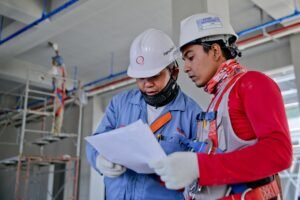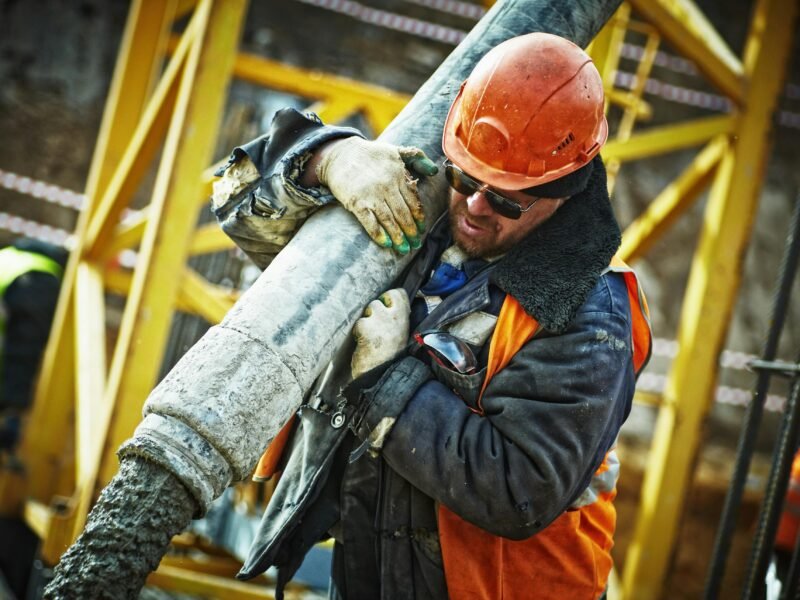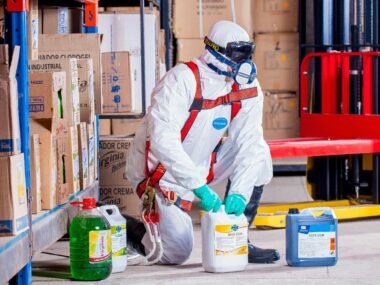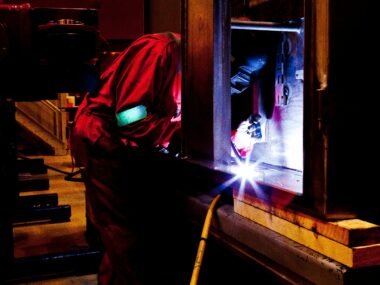How to secure construction jobs with visa sponsorship in Canada in 2024. Learn about types of employment, visa processes, and application tips.
Canada is, in general, one of the most attractive destinations for foreign skilled laborers and, more particularly, foreign construction workers. The country has seen rapid, continuous growth in infrastructure and residential and commercial projects, raising the demand for construction workers considerably.
A visa-sponsored construction job in Canada can give one a promising career with better returns and long-term opportunities. This guide will explain the types of construction jobs available and the process for seeking a visa sponsorship to work in Canada, including some application tips that could ensure your application is approved.

Why Construction Jobs in Canada?
Worth noting, the construction industry in Canada contributes significantly to the nation’s economy, employing over 1.4 million people and making valuable contributions towards the country’s GDP. This industry covers all construction sectors, from roads and bridges to houses and commercials. This workforce requirement and laborers’ retirement have created a need for foreign employment in the construction sectors.
The benefits of creating job opportunities in Canada through construction are enumerated below:
Growing Demand: Construction is one field in Canada that always requires professional workers to balance the labor shortage, especially in skilled jobs like electricians, carpenters, welders, and plumbers.
Good Income: The remuneration for laborers working in this industry within Canada is very high. The average earnings range from 40,000 CAD to 65,000 CAD per year for a construction laborer, depending on location and experience.
Career Growth: Construction workers can pursue certifications and licenses related to construction, which can lead them into specialized or supervisory positions with time. Permanent Residency Pathways: A few immigration programs enable foreign construction workers to apply for permanent residency status once they have work experience in Canada.

Types of Construction Jobs Available
The construction jobs in Canada range from unskilled and semi-skilled to skilled, with several specializations. The commonly available profiles are:
Construction Labourer: Labourers are engaged in a variety of activities, from digging to cleaning and moving materials. It is a hard job that requires stamina and a strong physique.
Carpenter: Carpenters are involved in the construction, assembly, and renovation of components of buildings, highways, and other structures that are primarily made of wood or other materials. This trade is in demand in every part of Canada.
Electrician: Electricians install and maintain electrical systems in residential, commercial, and industrial settings. This is an indispensable trade in construction processes.
Plumber: Plumbers are involved in installation, gas, drainage piping, and maintenance.
Welder: Welders join metals using heat and tools, essential in an infrastructure project involving bridges and pipelines.
Heavy Equipment Operator: Operators use heavy machinery, such as bulldozers, cranes, and excavators, to finish large-scale construction projects.
Mason/Bricklayer: These workers construct walls, chimneys, and other structures with bricks, stones, and concrete blocks.
Site Manager/Foreman: These individuals supervise the construction site to ensure that projects are completed on time and within budget.
Visa Sponsorship for Construction Workers
All construction-related jobs in Canada are subject to visa sponsorship, for which a Canadian employer takes full responsibility for your work permit application. The following are significant paths by which you can obtain visa sponsorship for the above job:
1. Temporary Foreign Worker Program- TFWP
Under the TFWP, Canadian employers can hire foreign workers due to labor shortages in specific industries such as construction. The said program provides qualifications when the employer:
Obtains an LMIA, indicating that no Canadian is available for the job.
Provides an offer of employment to the foreign worker, upon which such foreign worker can apply for a work permit.
The TFWP is ideal for those seeking temporary work in Canada but can also act as a stepping stone to permanent residency.
2. Federal Skilled Trades Program (FSTP)
Part of Canada’s Express Entry immigration system, the Federal Skilled Trades Program is designed for skilled workers in trades such as construction, plumbing, welding, and carpentry. Applicants must:
Have a valid job offer from a Canadian employer or a certificate of qualification from a Canadian authority.
Meet the language requirements in either English or French.
At least two continuous years of work experience in a skilled trade within five years from the day an application is received.
The program allows selected candidates to apply for permanent residency in Canada for long-term settlement.
3. Provincial Nominee Program (PNP)
The Provincial Nominee Program is a program under which Canada’s provinces and territories can nominate those immigrants who, as skilled workers, can meet the local labor market needs. Further, many provinces, including British Columbia, Alberta, and Ontario, seek to attract construction workers through their nominee programs.
To be eligible under the PNP:
Applicants must possess appropriate skills and experience in a high-demand trade in the province concerned.
A job offer from a provincial employer is generally required.
Other provinces require a valid LMIA.
Such nominated candidates have increased chances of being selected for permanent residency through the Express Entry system.

How to Apply for Construction Jobs in Canada
Following is a step-by-step procedure one can follow to stand a better chance of getting a visa-sponsored construction job in Canada:
Also, your resume should be customized according to Canadian standards, emphasizing your skills, certifications, and relevant work experiences. Mention any special qualifications you may have, such as Red Seal certification.
Search Online for Jobs: Look for job postings on popular portals such as Job Bank Canada, Indeed, and LinkedIn for construction job openings. Most employers list a visa sponsorship option when posting a job.
Networking with Canadian Employers: Building a network on LinkedIn, for example, with employers and recruiters in Canada, might lead to an offer of employment. Research the process for obtaining licenses and certifications in your trade.
Not all, but some construction jobs require special certification or licensing; examples include Red Seal certification for tradespeople. Check the licensing and certification requirements in your field/Province:
Apply for a Work Permit: Once the job offer is extended, apply for the work permit under the TFWP or other immigration avenue.
Apply for Provincial Nominee Programs: If you possess high-demand trade experience, apply using a Provincial Nominee Program (PNP) for fast processing.
How to Succeed
Language Skills: Develop your language skills in one or both Canadian languages: English or French. It will help you get better employment.
Get Certified: Certification, like the Red Seal program, will help you increase your hiring prospects in your trade.
Target High-Demand Regions: Target provinces with a high demand for construction workers, such as British Columbia, Alberta, and Ontario, and your job prospects will increase.
Keep updates from government websites and job portals, which will frequently update information about job availability and different types of immigration programs.
Conclusion
With the construction industry booming in Canada, there is so much opportunity for workers from abroad, especially those qualified in specialized areas. From various visa sponsorship pathways, such as the Temporary Foreign Worker Program, Express Entry, and Provincial Nominee Programs, it has always been challenging to find a job in construction within Canada.
Preparing a robust application, meeting the certification requirements, and targeting high-demand areas will successfully get on board with a rewarding construction career in Canada.




